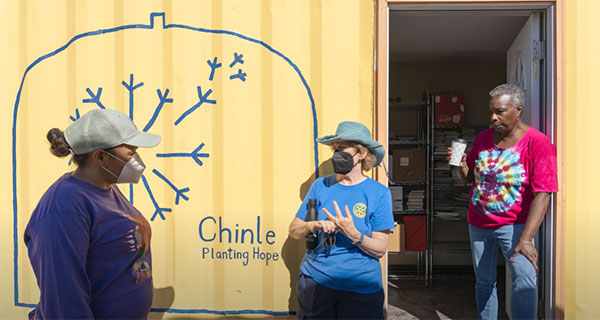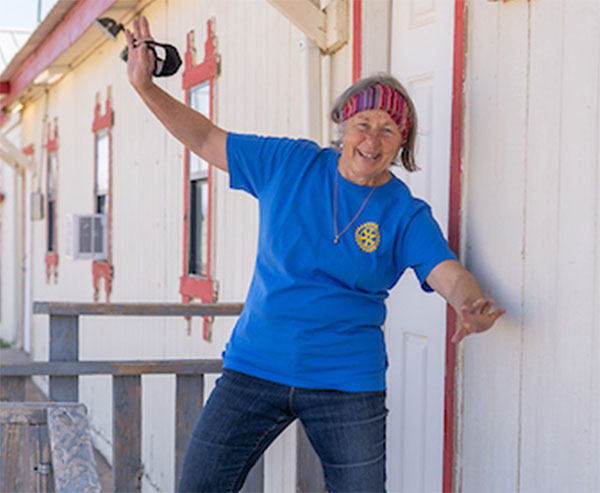Chinle Planting Hope
Imagine this. During the pandemic your schools have been closed for over a year. The nearest public library is over 70 miles away. There are no bookstores. Internet services are unreliable and often not available. How do parents and teachers continue their children’s education? How will students learn to read when there is nothing for them to read?
And then imagine your grandmother living alone, taking care of herself, her home, her sheep. During the pandemic, store hours have been restricted. It is difficult for her to get gas for her truck so she can get supplies, food, or haul water for herself and her livestock.
This has been the situation this last year not in some faraway foreign country, but right here in the United States, on the Navajo Nation, occupying the northern 1/3 of Arizona and extending into parts of Utah and New Mexico. When the pandemic threatened to overrun the reservation, Navajo leaders closed the entire Nation to prevent spread of the virus—no one could come in, no one could leave—a successful but harsh restriction.
In the Navajo community of Chinle, located near the center of the reservation, several women shared their fears, and then shared ideas about what they could do to strengthen their community, to help families, elders, and children survive. These women worked with local tribal leaders and created a nonprofit, Chinle Planting Hope.

One of the shipping containers has been transformed into an office for the nonprofit.
First, they worked to provide the essentials: water, for drinking, for washing, for livestock. Then they found ways to provide other essentials such as face masks to prevent the spread of the virus. They brought baskets filled with nearly a week’s supply of food to the elderly. They found ways to support education and literacy by obtaining funds to purchase a bookmobile with a sustainable budget. They received permission to use several “empty” acres of land located near the schools and the hospital. They purchased several large shipping containers that they are turning into an inviting and important community center offering a variety of services and a place to gather. They are developing a thrift store, mini-lending library, bicycle shop, an all-play park, and maybe a café, a place to sit in the shade, enjoy meeting friends.
Chinle Planting Hope is turning this small acreage of land into an inviting community center. Glenwood Springs Rotary is helping.

Nancy took part in a joyous, hardworking, four-day weekend in Chinle when members of Glenwood Springs Rotary delivered books and supplies, and assisted with efforts to turn shipping containers into a community center.
I had lived and worked in Chinle for many years and knew about Chinle Planting Hope. I am also one of the founding members of Read at Home, a small grass-roots nonprofit that encourages literacy by distributing free Highlights Magazine subscriptions to preschools on tribal nations. With Glenwood Springs Rotary’s support, over 450 individual subscriptions have been given to children on the Navajo Nation (Chinle) as well as the Shoshone-Bannock Reservation in Idaho.
After Glenwood Springs Rotary decided to support Read at Home, they realized they could make a bigger impact and partner with Chinle Planting Hope as well. Glenwood Springs Rotary provided funds, as a club and individually, over $10,000, to support Read at Home and allow it to expand to other tribal nations that have asked for support. Rotary also collected over 15,000 books for the bookmobile and bookstore as well as clothing and more for the thrift store, over 7,500 pounds of goods in all. Over a four-day weekend in September, Rotarians drove themselves, and these donations, the seven hours to Chinle. There they worked with Chinle Planting Hope to unload all the supplies, paint containers, build storage shelves and a playhouse. Rotarians hiked to remote canyons with their hosts, watched the sun set over magnificent Spider Rock, shared meals (and fry bread!) with a four-generation Navajo family, and watched their little ones run to the box of books we brought. The children didn’t want to eat! Instead, they asked, “Please read this book… Maybe one more, or two….” What an amazing experience.
Working together, true collaboration, means, “Yes, we can.” One of our club mottos conveys in simple words what we do: “service is where we shine.” We, Rotarians, can help create opportunities and resources that strengthen a community, that expand access to books, and support education.
Education means having a future.
(The video featured in this article was created, and donated, by Jan Sonnenmair.)